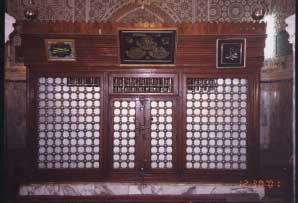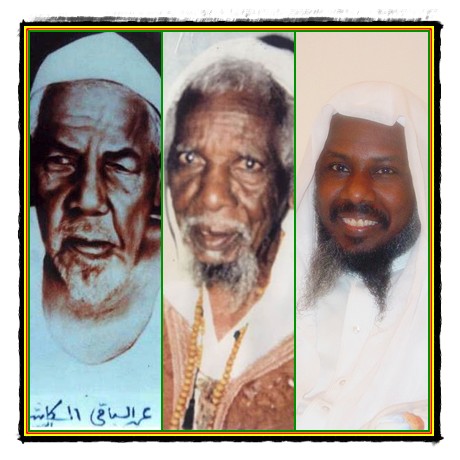Sídí Muhammad al-Jamal ar-Rifá‘í in Tafsir of Juz’ ‘Amma
[The Qur’ánic Súrah al-Qadr] was revealed in Makkah and consists of five verses. The reason behind its revelation was that when Allah commanded prostration and drawing near to Him [in the previous Súrah, al-‘Alaq], He then mentioned the moment in time which is most conducive to the greatest nearness and proximity to Him, so He said:
‘innáá ‘añzalnáhu fí laylati-l-qadr
“Indeed, We revealed it (sent it down) in the Night of Destiny” [Q97:1]
He extolled the rank of the Qur’án in that He confirmed its descent from Him and reinforced the attribution to Him by employing the use of the plural particle of dignity “We”, which shows His complete attentive care to it and for it; and it did not even mention the name of the Messenger himself (salla-lláhu ‘alayhi wa-sallim). This apparently is for plainly announcing the Messenger’s fundamental role, as if he is already present in the minds of the listeners.
Then He magnifed the moment in which it was sent down in revelation, when He said:
wa máá ‘adráka má laylatu-l-qadr
“And what will make you conceive what the Night of Decree is?” [Q97:2]
Phrasing the statement in this way is for the purpose of explaining that its reality is beyond the circle of understanding of the creation. None can truly know the full import of its immense reality except the One who is completely knowledgeable of the unseen… just as He says:
laylatu-l-qadri khayrum-min alfi shahr
“The Night of Power is better than one thousand months.” [Q97:3]
It is a summarized explication of its prestigious rank. And in the above two occasions where that Night is mentioned, there is no doubt of the supreme exaltation of its nature and affair. And the intended meaning of “revelation” (inzal) could be two meanings:
1) Its complete descent from the Preserved Tablet [Q85:22] to the lowest heaven, as the Prophet said that Allah caused the whole to descend at once from the Preserved Tablet to the lowest heaven on the Night of Qadr, and then for the next 23 years it descended from the lowest heaven piece by piece;
or 2) It could mean the beginning of its revelation, which is the more apparent meaning.
It was called the Night of Qadr because it is the night wherein affairs are decided and matters are decreed (taqdir), and in which all that is decreed during that particular year is manifested and enacted, in accordance with His saying, “In it every wise command is differentiated and enacted.” [Q44:4]. So Qadr can both refer to this enactment of the decrees, and can also mean its nobility and rank above other nights. It is commonly said that it falls on the night of the 27th of Ramadan.
And know that the Prophet saw that the life-spans of his followers would be shorter compared to the past nations, and he was afraid they would not reach the same amount of deeds performed by past nations because they had longer lives, so Allah honored him with this night which is better than 1000 months [83 years and four months]. Then He further unveiled some of its honor by saying:
tanazzalu-l-maláá’ikatu wa-r-rúhu fíhá
“The angels and the Spirit descend in it in hosts…” [Q97:4a]
The ‘Spirit‘ can refer to the archangel Jibríl (‘alayhi-s-salám), or another angelic creature that cannot be seen by the angels. And the meaning of ‘descending’ is their descending to the earth and greeting the people and saying “Amín” after their supplications.
bi-‘idhni rabbihim
“…by the permission of their Lord…” [Q97:4b]
They descend by the command of Allah, as a mercy to the believing and humble slaves of Allah, who invoke His Great Name and seek His forgiveness.
miñ kulli ‘amr
“…with all decrees (alt: on every errand).” [Q97:4c]
Their descent is for the purpose of every decree which Allah decreed for that particular year; for Allah informs the angels of all that is to occur during that year. Since this is their most important task, He said that this is the reason for their descent; although this does not conflict with their other tasks of greeing the believers and bringing blessings to them and supplicating for them.
salámun hiya
“Peace it is!…” [Q97:5a]
Because “it is” (hiya) is the 27th word of the Súrah, many commentators have stated that it falls on the 27th night of the month of Ramadan. Then Allah mentioned its limit in time when He continued:
hattá matla‘i-l-fajr
“…until the rising of the dawn.” [Q97:5b]
And know, my beloved, that for the people of hearts among the gnostic knowers, all moments are “nights of power,” and all places for them are ‘Arafah (the mount of Hajj), and all days for them are Fridays. Because the reason for exalting a certain time or place above others is because of the blessings that lie in them, such as opportunities for drawing closer, unveilings, openings, etc. And for the gnostic knowers, all moments are such, as one poet said:
Were it not for [my] witnessing Your effulgent beauty in my essence,
Then I would not be content for any hour of my life.
The ‘Night of Power’ has no special distinctions and honor,
If it is not with You that I fill up my moments.
Indeed, if the lover is established in his love,
And love does not depend on specific moments,
Then all nights become ‘Nights of Power’ if [the Beloved] appears,
Just like all days become Fridays when the meeting occurs.
And we say: And the praise belongs to Allah, that all of our moments are ‘nights of power’ if our hearts are fully facing Allah, and if we do not stand up except by Allah, or act except by Allah, or not see any but Allah; sincere in one’s devotion to Him, leaning away from all falsehood towards the truth, bowing to, standing for, prostrating to, and invoking Him in all states, all places, and all moments.
And know that the reward for acts of worshipful devotion in this blessed night in this blessed month is nothing less than unveiling of the veil, opening of the door, and witnessing of the Holy Essence, which cannot be measured or compared to anything!
I ask Him, Most High, that He keep us constantly in His protection,
and grant us His satisfaction,
for He hears and responds.
Amín!




